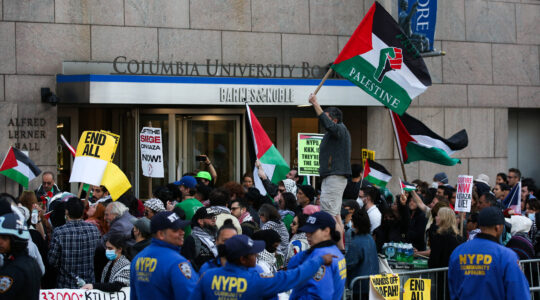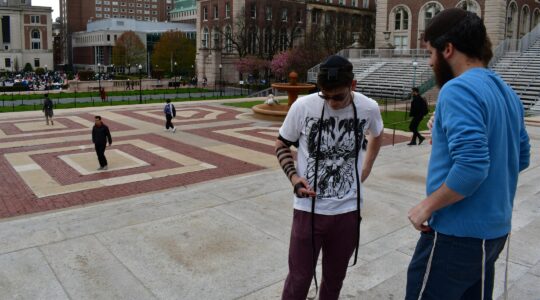NEW YORK (JTA) – A Minnesota university has reinvited Archbishop Desmond Tutu just days after it became known that the school had nixed a planned appearance by the Nobel Peace Prize-winning humanitarian.
Tutu had been slated to visit the University of St. Thomas next spring as part of a program that brings Nobel laureates to teach youth about peace and justice.
But last week the university’s president, the Rev. Dennis Dease, issued a statement saying he had canceled the appearance after consulting with local Jewish leaders and concluding that Tutu had made comments that could be deemed offensive to Jews.
On Tuesday, however, the national director of the Anti-Defamation League, Abraham Foxman, sent Dease a letter urging the school to reissue its invitation to Tutu. The next day, Dease announced he was reversing himself.
“I have wrestled with what is the right thing to do in this situation, and I have concluded that I made the wrong decision earlier this year not to invite the archbishop,” Dease said in a statement. “Although well-intentioned, I did not have all of the facts and points of view, but now I do.”
News of the university’s initial decision to drop Tutu prompted an uproar and revived claims that some Jewish groups seek to quash public criticism of Israel.
University officials did not say whether Foxman’s letter affected Dease’s decision, but they said he had received a steady stream of phone calls and e-mails when the story broke last week.
In an interview with JTA on Tuesday, Foxman explained his thinking.
“Tutu has certainly been an outspoken, sometimes very harsh critic of Israel and Israeli policies, and has sometimes also used examples which may cross the line,” the ADL leader said. But, he added, Tutu “certainly is not an anti-Semite and should not be so characterized and therefore refused a platform.”
Coming just weeks after Iranian President Mahmoud Ahmadinejad was invited to Columbia University, the controversy over Tutu, an icon of the peaceful struggle against apartheid, has become the latest point of contention in what is shaping up to be a fierce season of Middle East controversy on campus.
Tutu has condemned suicide terrorism against Israel and recognized the Jewish state’s right to secure boundaries. He has spoken admiringly about the Jewish role in fighting apartheid, though he has also noted Israel’s alliance with the apartheid South African government. He was even honored in 2003 by Yeshiva University’s law school with an award for promoting world peace.
After the Tutu cancellation was reported last week in City Pages, the Minneapolis alternative weekly, Dease issued an explanation.
“We became aware of concerns about some of Archbishop Tutu’s widely publicized statements that have been hurtful to members of the Jewish community,” Dease said in a statement released last Friday. “I spoke with Jews for whom I have great respect. What stung these individuals was not that Archbishop Tutu criticized Israel but how he did so, and the moral equivalencies that they felt he drew between Israel’s policies and those of Nazi Germany, and between Zionism and racism.”
Among the Jews with whom Dease spoke was Julie Swiler, the public affairs director for the Jewish Community Relations Council of Minnesota and the Dakotas.
Swiler told JTA that after the university approached the JCRC for an opinion about Tutu, she discovered a speech he delivered in Boston in 2002 in which he compared the power of the “Jewish lobby” to Hitler, and Israeli policies to those of the South African apartheid regime.
“People are scared in this country to say wrong is wrong. Because the Jewish lobby is powerful – very powerful,” said Tutu, according to a transcript posted on the Web site of Friends of Sabeel – North America.
“So what? So what!” he added. “This is God’s world! For goodness sake this is God’s world! The Apartheid government was very powerful, but we said to them: Watch it! If you flout the laws of this universe, you’re going to bite the dust! Hitler was powerful. Mussolini was powerful. Stalin was powerful. Idi Amin was powerful. Pinochet was powerful. The Apartheid government was powerful. Milosevic was powerful. But, this is God’s world. A lie, injustice, oppression, those will never prevail in the world of this God. That is what we told our people. And we used to say: those ones, they have already lost, they are, they are going to bite the dust.”
Next, Tutu said, “an unjust Israeli government, however, powerful will fall in the world of this kind of God,” then immediately added that since “we don’t want for that to happen,” it is vital to convince the Israelis and Palestinians that “peace is possible.” He ended by saying: “We will do all we can to assist you in achieving this peace which is within your grasp, because it is God’s dream that you will be able to live amicably together as sisters and brothers, side by side because you belong in God’s family. Peace! Peace! Peace!”
Swiler said she told the university that those comments go beyond legitimate criticism of Israel.
“I think most people in the Jewish community would find comparing the quote-unquote Jewish lobby to Hitler offensive,” she said.
Swiler insisted that no recommendation was sought and none was given to the question of whether Tutu should be invited to campus. And though Swiler said that Tutu’s views should be heard even though he has a “blind spot” when it comes to Israel, she would not offer an opinion on the university’s decision to deny him a platform.
“We’re not talking about David Duke here,” said Cecilie Surasky, the communications director for Jewish Voice for Peace and editor of the blog Muzzlewatch, which chronicles suppression of dissenting voices in the Middle East debate.
“I think most people would agree they wouldn’t want to spend their dollars giving David Duke a platform,” Surasky said. “But what we are talking about is Nobel Prize winners, top academics. Those people are the ones that are having trouble speaking without fear of attack by what I could call self-appointed gatekeepers.”
Surasky added that whatever the particulars of this case, the impression of the Tutu incident is that the pro-Israel lobby has again squashed views it doesn’t like.
Both the university and the Minnesota JCRC have explicitly denied that any Jewish pressure was exerted to have the speech canceled. A school spokesman said the university’s decision was informed in part by its experience two years ago hosting the conservative provocateur Ann Coulter.
Mindful that it might appear to outsiders that Jewish pressure played a role, Swiler emphasized repeatedly that she does not believe Tutu is an anti-Semite and that he has a right to be heard.
Not all Jewish groups, however, agree with that view.
“Desmond Tutu is an anti-Semite who hates Jews and is obsessed with demeaning and smearing the Jewish state,” said Morton Klein, president of the Zionist Organization of America.
Tutu’s 2002 speech was delivered at a conference sponsored by Sabeel, a Christian Palestinian group that some have described as anti-Semitic, and has become a prime exhibit of the archbishop’s supposed hostility to Israel.
Tutu is slated to speak againat a Sabeel conference later this month in Boston titled “The Apartheid Paradigm in Palestine-Israel.”





